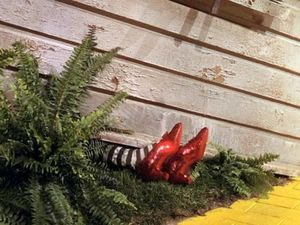Uncategorized
How You Met My Mother
by
Dialogue is crucially important for any story. In a written tale, it’s possible to go inside someone’s head to learn what he or she is thinking, but in real life, our thoughts are mostly communicated by the words we speak to one another. Dialogue can advance a plot or reveal information—sometimes clumsily, as when the forensic technicians on CSI would explain the tools to one another for the benefit of their audience. Dialogue can also illuminate character through word choice and style. If you pick your phrases right, your reader will get a vivid picture of the speaker from just a few key sentences.
Take, for example, my mother. I could tell you lots of factoids about my mother. Instead, I’ll relay the following story and let you form your own conclusions:
The summer of my seventeenth year, I drove a car into my house. I had completed the Driver’s Ed classroom course with a hundred percent score. With my freshly printed permit in hand, I was eager to try my luck behind an actual wheel. My mother said I could have the keys and we set out with my little brother in tow to visit the local library.
We lived on the corner of a fairly quiet side street and a much busier main road. I backed the car out of the driveway okay and maneuvered it to the corner. I had never even turned a car on before, so the idea that I should take it onto the open road seemed ludicrous to me. My mother, however, was game on. “Turn the wheel and give it some gas,” she instructed.
For the record, I said, “Shouldn’t I be in a parking lot?”
My mother said, “Just make a right turn. It’s easy enough.”
She did not say how far to turn the wheel or how much gas to give it, so I turned the wheel very far and gave it a heck of a lot of gas. We made a hairpin turn at high speed, wrecking the rear axel of the car as we jumped the high curb.
Now we were hurtling across my front lawn, heading for the cement steps. “Brake! Brake!” my mother hollered.
“I’m trying!” I hollered back, sure that we were going to die. Problem was, I had no idea which pedal was which. I gave it even more gas.

My mother jerked the wheel at the last minute, and instead of hitting the cement steps head-on, we demolished a group of bushes and careened into the front porch. I knocked a support beam out from under the front of the house, and it collapsed on top of the car, which is what finally stopped it.
We all got out, miraculously unharmed. A Ford Taurus lay dead in front of us, sticking out from under the house like the Wicked Witch of the East when Dorothy lands on her after the tornado. Hand to God, the first thing my mother said was, “I never liked those bushes anyway.”
So there you go. Now you know my mother. This is a line only she would say, and so it encapsulates her in a way that a long list of adjectives never could. It’s the same economy of description that I aim for when I’m inventing fictional people.
Amazingly, the car lived to ride again, but there is a sad epilogue to this story. Are you ready?
Those bushes grew back.

